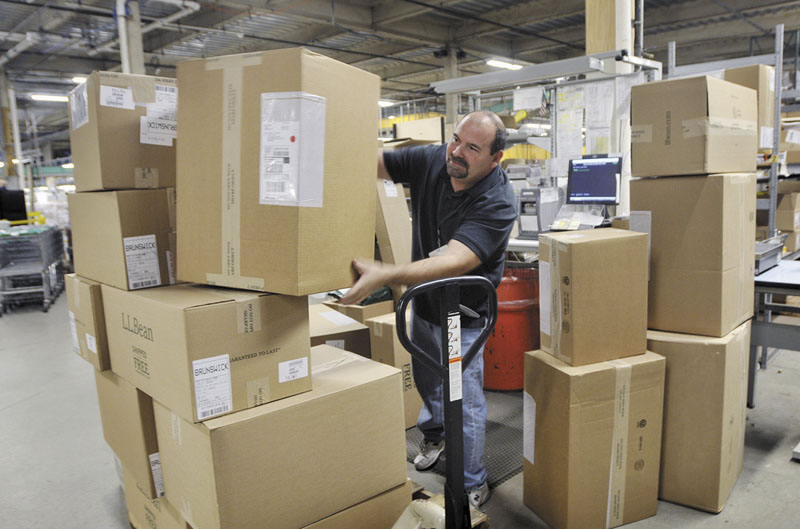WASHINGTON — A bill to allow states to collect taxes from online retailers inched forward in the Senate on Thursday, but a small, bipartisan group of opponents from states without sales taxes delayed work on the legislation for several days.
The bill, which would force many online shoppers to pay sales taxes for the first time, appears poised for easy passage when the Senate returns in early May after a one-week recess. But opponents blocked consideration of several amendments, leaving in procedural limbo a proposal by Maine’s senators to give retailers more time to comply with the new law.
Maine-based L.L. Bean — a major online seller and one of the state’s largest employers — and other retailers sought the extension.
“The bill still has to go through the House and go to the president, so there is a fair amount of time that is going to elapse,” said Sen. Angus King, who co-sponsored the amendment with Sen. Susan Collins. “We are going to try to get the amendment attached either here or in the House.”
The online sales tax bill has broad bipartisan support in the Senate but could face opposition in the House. Online retailers with more than $1 million in annual sales would have to collect taxes and make the payments to buyers’ home states.
Supporters say the measure is needed to “level the playing field” between the growing online retail market and traditional retailers — especially small stores — who are required to collect sales taxes.
But a minority of senators, from states without sales taxes including New Hampshire, succeeded in delaying votes on the measure. They say the bill would unfairly burden small businesses in their states.
“The proponents of the bill talk about this being a way to be fair to retailers. Well, it’s not fair to our retailers,” said New Hampshire’s Sen. Jeanne Shaheen, a Democrat, before Thursday’s vote. “I think giving states the ability to opt out, or an exemption, makes sense.”
According to the National Conference of State Legislatures, states missed out on an estimated $23 billion in taxes on online sales last year. Under current law, shoppers who live in states with sales or use taxes should pay those taxes, often on their income tax filings. But few do.
In 2011, only about 10 percent of Maine tax filers paid an additional “use tax” for out-of-state purchases, returning $2.8 million to the state.
Maine Revenue Services estimates that the state misses out on $15 million to $25 million a year in tax revenue from online sales.
On Thursday, King and Collins tried to introduce an amendment to give retailers one year to begin collecting taxes from online buyers. But opponents blocked consideration of that and several other amendments. Under the Senate’s complex rules, it was unclear Thursday whether the attempt to delay implementation will be considered in early May.
“This is not a new concept in any way. It has been talked about at length for over a decade,” Collins said in response to opponents’ complaints that the bill bypassed committee review. “If this bill were so problematic for retailers across the country, why would it have the support of so many retailers?”
L.L. Bean and other retailers want the longer time frame so they can set up computer programs capable of navigating thousands of state and local tax codes across the country. The majority of sales by L.L. Bean occur online or through catalogs.
“We’re not opposed to the legislation, we just think the implementation time needs to be reasonable,” said Carolyn Beem, spokeswoman for the Freeport-based company.
While even a year is “on the short end,” Beem said it is preferable to the 180-day window in the current version.
A major complicating factor for retailers is that tax laws vary dramatically by state and even by locality. For instance, athletic shoes are taxed at a different rate from walking shoes in some states but there are no uniform, nationwide definitions for products.
“We might sell something that we consider to be casual clothing and some states might consider it to be athletic wear, and that will change from state to state,” Beem said.
In Maine, groups such as the Maine State Chamber of Commerce and the Retail Association of Maine have endorsed the measure. While Amazon.com, the nation’s largest online retailer, supports the bill, eBay has launched a campaign to oppose it.
Among those who oppose the bill is Travis Adams, whose Hudson, N.H.-based business, Whaddy.com, reprocesses and sells items returned to Amazon and other retailers.
Adams said his company has six employees and is on track to surpass $1 million in sales this year. While that may seem like a large number to some people, Adams said, businesses such as his have such slim margins that it often translates into little, if any, profit.
Requiring him to start a tax collection system will only shrink those margins and hurt his company’s ability to grow, he said.
“Really, it’s unfair to all small businesses,” Adams said in a phone interview. “It would require all of the businesses to become tax collectors for all of these other states, and that’s a tough thing for a small business to do.”
Kevin Miller can be contacted at 317-6256 or at:
kmiller@mainetoday.com
On Twitter: @KevinMillerDC
Send questions/comments to the editors.




Comments are no longer available on this story